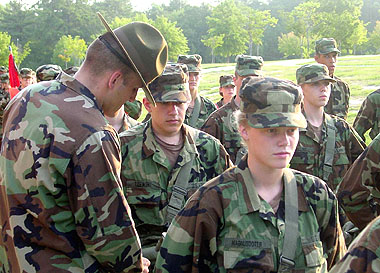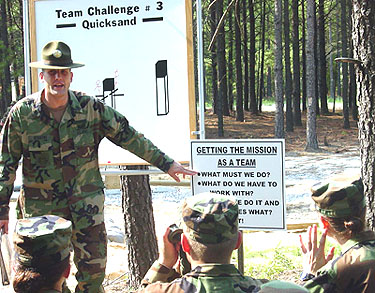A day in the life of a drill sergeant
By Sgt. Shawn Woodard
Fort Jackson Leader
FORT JACKSON, S.C. (Sept. 12, 2002) -- It was around 4:45 a.m. on Aug.
22 when 2nd Battalion, 13th Infantry drill sergeants
began to file into Classroom 1 for their monthly Noncommissioned Officers
Professional Development.
Staff Sgt. (P) Bruce Derdoski and his peers wore physical fitness uniforms
as they sat at their desks while Command Sgt. Maj. Rock Simms spoke about
preparing for basic marksmanship training.
It was now 5 a.m. and the drill sergeants were already an hour into
their day.
 After
learning how to tighten their shot group while teaching BRM to trainees,
the drill sergeants departed for their platoon formation areas where their
soldiers silently stood at parade rest waiting for further instructions.
In their second week of training, the soldiers seemed to be unsure of what
would happen next.
After
learning how to tighten their shot group while teaching BRM to trainees,
the drill sergeants departed for their platoon formation areas where their
soldiers silently stood at parade rest waiting for further instructions.
In their second week of training, the soldiers seemed to be unsure of what
would happen next.
Derdoski took his place at the front of 2nd Platoon to give
his platoon’s accountability report to the first sergeant. Immediately
following the report, Derdoski dropped his salute and did an about face
movement.
"Right face, forward march," he shouted, and he moved his soldiers to
the physical fitness area where they stretched before running. For nearly
three miles, drill sergeants Derdoski and Staff Sgt. Joseph Commander kept
their soldiers in step while sounding off with various motivation cadences.
As the soldiers struggled to catch their breath, Commander marched them
back to the company area for their cool-down. After about 10 minutes of
stretching, the "pit bulls" were marched to breakfast - 30 minutes for
a platoon of 60 soldiers. But, before eating any meal during the day, soldiers
were required to answer their drill sergeants’ questions.
"What is your first general order?" Commander asked with a stern expression.
He immediately turned to the next in line only to see a nervous soldier
standing at parade rest with his head facing forward.
"Hey soldier, who is your battalion commander?" the drill sergeant shouted
as he began to pace back and forth. The soldier responded with a blank
stare and Commander shouted, "go to back of the line."
This was a way to get soldiers to read their Soldiers Handbook. The
process continued until every soldier had entered the dining facility.
Derdoski said that his soldiers would have general knowledge of the military
before graduating. Any time you find a soldier simply doing nothing, Derdoski
said he or she should be constantly drilled with the Army values, general
orders, rank structure etc.
Forty minutes had past and BDU-clad soldiers were back in the platoon
area formation area standing at parade rest. The soldiers had 10 minutes
to prepare for formation. Therefore, the drill sergeants had to change
twice as fast to be standing tall at the formation area when the soldiers
arrived.
Most days, this means drill sergeants don’t have the opportunity to
eat breakfast. Because these soldiers are still in their first phase, red
phase, the drill sergeants must be present before formation begins to discipline
soldiers who fail to be punctual. Usually, it means mass punishment, which
is a method to instill the team concept in individuals from different backgrounds.
 The
sun had begun to affect the soldiers as drill sergeants constantly raised
their campaign hats to wipe the sweat from their foreheads. Before stepping
off to the training site, Derdoski ordered every soldier to drink water
from his or her canteen knowing that the temperature had already reached
the mid 90s. It was only 8 a.m. and heat could already be seen rising on
the hot pavement from a distance.
The
sun had begun to affect the soldiers as drill sergeants constantly raised
their campaign hats to wipe the sweat from their foreheads. Before stepping
off to the training site, Derdoski ordered every soldier to drink water
from his or her canteen knowing that the temperature had already reached
the mid 90s. It was only 8 a.m. and heat could already be seen rising on
the hot pavement from a distance.
Derdoski had a unique way of getting his soldiers to respond to his
leadership style in tough conditions. During the water break, he asked
to drink from a soldier’s canteen. He said many people would not drink
from a soldier’s canteen. But Derdoski said it was an opportunity to show
his soldiers that although he’s hard on them, he is not a super hero.
Little things like the canteen incident proved to be effective with
the soldiers as the 6-foot-4-inch father figure continues to have one of
the best platoons at the end of the cycle.
Derdoski was constantly teaching as he continued to shout, "Get in step,
soldiers."
"You better get in step and swing your arms nine to the front, six to
the rear," he yelled. After being on the trail for nearly two years, Derdoski
is considered a veteran at transforming civilians into well-trained soldiers.
"Drill sergeant Derdoski and I attended school together and began our
journey on the trail about the same time," said Sgt. 1st Class
Michelle Linder. "He has been like a role model since we came on the trail.
I admire his leadership style, which is very soldier-oriented. It is amazing
how he is able to exert so much energy every day training soldiers."
The answer is simply – he truly loves what he does and expects nothing
less from his "battles."
After arriving at the Team Developing Course, soldiers were instructed
to move into shaded areas. There was slight delay in the training process
due to other occupants. Therefore, drill sergeants found it to be the perfect
opportunity to have soldiers recite the Soldiers’ Code of Conduct while
waiting for training to begin.
"On your feet," shouted Derdoski. "First and second squad follow me
and the remaining squads follow Drill Sergeant Commander."
The teamwork development training was under way as drill sergeants gave
the soldiers a scenario before each event and the soldiers executed it.
The training gave Dedoski an opportunity to tip his "brown round" and
momentarily massage his forehead from the frustration of working 17-hour
days during red phase. It was a chance to observe which soldiers were willing
to step up and be the leader and make the decisions.
After sitting out during two events, Derdoski could watch no longer.
He decided to participate in the training exercise while demonstrating
teamwork between drill sergeant and trainee.
The day was nearly coming to an end but not before taking a trip to
the local Post Exchange. Derdoski checked each and every bag that left
the PX to ensure that not only the trainees were trying to pull a fast
one but to ensure they did not buy unnecessary products.
"Soldier, are you sure you want to buy this and waste a whole dollar?"
said Derdoski. "The Army is issuing insect repellant for free. I’m not
saying that you can’t buy it, but I wouldn’t."
Derdoski always went that extra mile to get the trainees to understand
drill sergeants are only trying to help. For instance, at the end of the
day during mail call, Derdoski had soldiers read inspirational poetry.
When he attended basic training, the poetry gave him a positive outlook
on training. He only hopes it has the same affect on his soldiers.
It was now an hour before lights out and Derdoski sat in his office
slowly making the transformation from drill sergeant to husband and father.
As he prepared for the next day’s training, his voice cracked from yelling
all day and echoed throughout the bay. He calmly instructed his soldiers
to prepare for lights out. It was like a father telling his children good
night.
 After
learning how to tighten their shot group while teaching BRM to trainees,
the drill sergeants departed for their platoon formation areas where their
soldiers silently stood at parade rest waiting for further instructions.
In their second week of training, the soldiers seemed to be unsure of what
would happen next.
After
learning how to tighten their shot group while teaching BRM to trainees,
the drill sergeants departed for their platoon formation areas where their
soldiers silently stood at parade rest waiting for further instructions.
In their second week of training, the soldiers seemed to be unsure of what
would happen next.
 The
sun had begun to affect the soldiers as drill sergeants constantly raised
their campaign hats to wipe the sweat from their foreheads. Before stepping
off to the training site, Derdoski ordered every soldier to drink water
from his or her canteen knowing that the temperature had already reached
the mid 90s. It was only 8 a.m. and heat could already be seen rising on
the hot pavement from a distance.
The
sun had begun to affect the soldiers as drill sergeants constantly raised
their campaign hats to wipe the sweat from their foreheads. Before stepping
off to the training site, Derdoski ordered every soldier to drink water
from his or her canteen knowing that the temperature had already reached
the mid 90s. It was only 8 a.m. and heat could already be seen rising on
the hot pavement from a distance.